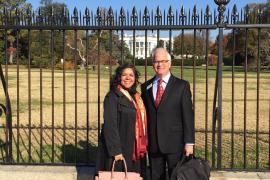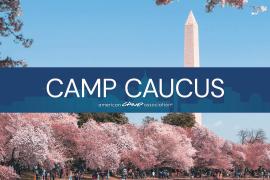Throughout the pandemic, the American Camp Association (ACA) has been advocating for the full field of camp at the national level to ensure that camps can operate fully — without additional barriers or unintended consequences that might result from new national legislation or regulation. The following article will provide updates on a number of current key initiatives.
BridgeUSA J-1 Cultural Exchange
Travel bans have been lifted and international travel has resumed. The London Embassy had a meeting with camp sponsors recently and word has just been received that they will have plenty of appointments available for camp counselors this year — perhaps as many as 13,000.
ACA has been diligent in our continued work to ensure that the BridgeUSA J-1 program is operating and procedurally appropriate for where camps are right now. Nicole Elkon, deputy assistant secretary for exchange, Bureau of Education and Cultural Affairs at the US Department of State, virtually attended the 2022 ACA National Conference and presented at the BridgeUSA J-1 session along with her colleague Karen Ward.
Working in concert with Deputy Assistant Elkon, the Depart of State has,
- Waived the 10 percent limit on third year + BridgeUSA J1 participant returners to allow the number of multi-year returners to organically grow back to pre-pandemic levels in 2022.
- Removed the requirement for BridgeUSA J-1 applicants to have the same SEVIS number to qualify for the 48-month interview waiver. This means J-1 applicants with SEVIS history within 48 months do not need to be interviewed again.
ACA has also submitted comments on the proposed Schedule of Fees for Consular Services — Nonimmigrant and Special Visa Fees. We have urged the Department of State to consider a smaller fee increase for these BridgeUSA J-1 Camp Counselor and Summer Work Travel short-term visa programs reflecting their shorter duration.
Camping and Transportation Regulation
In 2014, updates to national transportation regulation related to motorcoaches and commercial vehicles was being interpreted to include camps, although the regulation was intended to exclude them. ACA and its coalition partners successfully advocated for camp buses and similar camp vehicles to be excluded in the enforcement of this regulation.
Although the exemption for recreational vehicles was practiced by agencies, a new rule was added to the US Code to explicitly exclude them, bringing the code into line with the intention of the original regulatory changes. US Code 49:13506 states:
Exempt Unless Otherwise Necessary — Except to the extent the Secretary or Board, as applicable, finds it necessary to exercise jurisdiction to carry out the transportation policy of section 13101, neither the Secretary nor the Board has jurisdiction under this part over
(4) transportation by a motor vehicle designed or used to transport not fewer than 9, and not more than 15, passengers (including the driver), whether operated alone or with a trailer attached for the transport of recreational equipment, if—
(A) the motor vehicle is operated by a person that provides recreational activities;
(B) the transportation is provided within a 150 air-mile radius of the location at which passengers initially boarded the motor vehicle at the outset of the trip; and
(C) in the case of a motor vehicle transporting passengers over a route between a place in a State and a place in another State, the person operating the motor vehicle is lawfully providing transportation of passengers over the entire route in accordance with applicable State law.
The inclusion of an exemption for recreational vehicles into the US Code is a direct result of ACA’s advocacy efforts.
Federal Lands Minimum Wage
On November 22, 2021, the Department of Labor announced publication of the final rule to implement President Biden’s Executive Order (EO) 14026, which raises the minimum wage paid by those contractors to workers performing work on or in connection with covered federal contracts to $15.00 per hour, beginning January 30, 2022.
The scope of EO 14026 is truly monumental and the threat to youth-serving organizations as it applies to virtually all forms of contracts, including Outfitter Guide Permits, which are used by rafting companies that run their trips on federal lands.
ACA has submitted public comments and has strategized with coalition partners to carve an exemption similar to or the same as the one ACA won in Executive Order 13658.
Several lawsuits have already been filed in federal court directly challenging the implementation of EO 14026. On Feb. 9, 2022, the attorneys general of Arizona, Idaho, Indiana, and Nebraska filed suit in Arizona federal district court, alleging that EO 14026 constitutes an improper response to Congress’s rejection of the same minimum wage increase in a COVID-19 relief package.
On February 17, 2022, the Seventh Circuit Court issued an order enjoining the government from enforcing the Minimum Wage Order in the context of contracts or contract-like instruments entered with the federal government in connection with seasonal recreational services or seasonal recreational equipment rental for the general public on federal lands.
Currently, EO 14026 is not being enforced for seasonal recreational industries, including camps. ACA continues to monitor the situation and prepare for the most likely outcomes.
Camp-School Partnerships
The American Rescue Plan Elementary and Secondary School Emergency Relief (ARP ESSER) III has $8 billion at the state level and $22 billion at the school district level to include out-of-school time partnerships to be used for summer and after-school programs through 2024. The legislation encouraged school districts to seek out new community partners, including camps, as partners in addressing the negative impacts of the pandemic on children emotional and academic learning. ACA has created Camp-School Partnership Guide and Toolkit to help keep taking advantage of this unprecedented opportunity to provide kids with a meaningful camp experience.
In addition, ACA is working to identify funding to provide incentives for camps and school districts to engage in these partnerships over the next two years.
The views and opinions expressed by contributors are their own and do not necessarily reflect the views of the American Camp Association or ACA employees.



